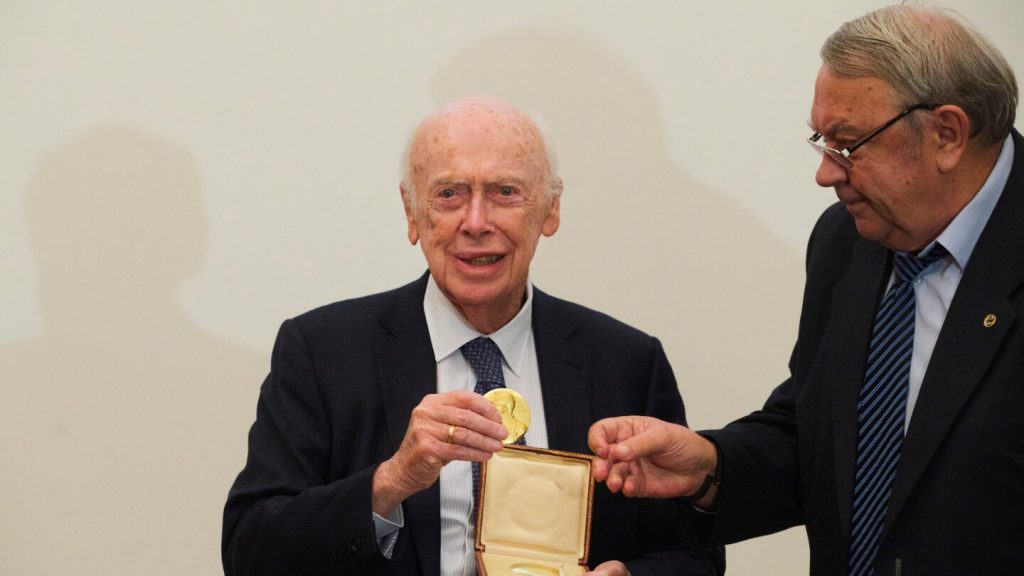Listen to the article
DNA Pioneer James Watson Dies at 97, Leaving Complex Legacy
James Watson, the Nobel Prize-winning scientist whose discovery of DNA’s double-helix structure revolutionized biology, died Thursday at the age of 97, according to his former research laboratory.
The breakthrough moment came on a foggy Saturday morning in 1953, when the then 24-year-old Watson was manipulating cardboard cutouts representing DNA fragments. As he arranged the pieces, Watson suddenly realized they formed a twisted ladder shape—what would become known as the double helix. His immediate reaction, “It’s so beautiful,” belied the monumental importance of what he had just discovered.
The structure of deoxyribonucleic acid (DNA) is now considered one of the most significant scientific findings of the 20th century, ranking alongside Charles Darwin’s theory of evolution and Gregor Mendel’s laws of genetics as foundational to modern biology, according to Bruce Stillman, president of Cold Spring Harbor Laboratory.
Watson shared the 1962 Nobel Prize in Physiology or Medicine with Francis Crick and Maurice Wilkins. Their work relied heavily on X-ray crystallography research conducted by Rosalind Franklin and her graduate student Raymond Gosling—contributions that many historians believe were not adequately acknowledged at the time. Franklin, who died in 1958 at just 37, has since become emblematic of female scientists whose work was overlooked or marginalized.
The double-helix discovery immediately suggested mechanisms for how genetic information is stored and transmitted, revealing how cells replicate their DNA before division to ensure each new cell receives a complete genetic blueprint. “There was no way we could have foreseen the explosive impact of the double helix on science and society,” Watson later wrote.
Beyond the laboratory, the double helix has become an internationally recognized symbol of scientific progress. The discovery catalyzed decades of subsequent breakthroughs in genetic engineering, personalized medicine, forensic science, and genealogy. It enabled the development of gene therapy treatments, DNA fingerprinting for criminal investigations, and ancestry tracing methods that have transformed how we understand human relationships.
Following the landmark discovery, Watson taught at Harvard University from 1955 to 1976, where he built the institution’s molecular biology program. He later served as director of Cold Spring Harbor Laboratory beginning in 1968, eventually becoming its president in 1994 and chancellor in 2004.
From 1988 to 1992, Watson directed the Human Genome Project, the ambitious federal initiative to map the complete sequence of human DNA. He proactively established the project’s significant investment in ethics research, later calling it “probably the wisest thing I’ve done over the past decade.”
Despite his scientific brilliance, Watson’s legacy is complicated by controversial statements about race, gender, and sexuality that damaged his reputation in later years. In 2007, he told a British newspaper he was “inherently gloomy about the prospect of Africa” because “all our social policies are based on the fact that their intelligence is the same as ours—where all the testing says not really.”
The remarks triggered international condemnation and led to his suspension from Cold Spring Harbor Laboratory. He retired from his chancellor position shortly thereafter. When asked in a 2019 documentary if his views had changed, Watson responded, “No, not at all,” prompting the laboratory to revoke his remaining honorary titles.
“I only wish that Jim’s views on society and humanity could have matched his brilliant scientific insights,” said Dr. Francis Collins, then-director of the National Institutes of Health.
Watson’s contradictory legacy—scientific genius paired with deeply problematic social views—reflects the complex relationship between brilliant discovery and personal character. While his work on DNA fundamentally transformed medicine, agriculture, and our understanding of life itself, his later statements serve as a reminder that scientific achievement does not necessarily correlate with wisdom in all domains.
The impact of Watson’s discovery continues to resonate across disciplines, raising profound questions about the ethical implications of genetic knowledge—questions that scientists, policymakers, and society will continue to grapple with for generations to come.
Fact Checker
Verify the accuracy of this article using The Disinformation Commission analysis and real-time sources.




11 Comments
The ethical debates surrounding Watson’s work are complex and ongoing. As science progresses, it’s important to carefully consider the implications and ensure appropriate safeguards are in place.
The ethical debates around Watson’s work are understandable, given the potential for misuse of genetic information. However, the core scientific advancements have undoubtedly led to tremendous medical progress that has improved countless lives.
That’s a fair point. The ethical concerns are valid, but the positive impact of this research can’t be overstated.
I’m curious to learn more about Rosalind Franklin’s role in the DNA discovery. Her contributions seem to have been overlooked for many years, which is unfortunate. A more complete understanding of the history would be valuable.
While Watson’s personal views may be controversial, his scientific contributions are undeniably significant. The double-helix structure of DNA has been a transformative finding for biology and medicine.
DNA’s double-helix structure was truly a groundbreaking discovery. Watson’s work opened up so many possibilities in medicine and genetics. While there have been debates around his controversial views, his scientific contributions are undeniable.
Agreed, the implications of understanding DNA’s structure have been profound. It’s remarkable what Watson and his team were able to uncover.
Watson’s work was truly revolutionary, but it’s important to acknowledge the complexities and controversies surrounding his legacy. Scientific breakthroughs often raise challenging ethical questions that society must grapple with.
Well said. The advances in genetics and medicine are remarkable, but the ethical implications deserve careful consideration.
It’s fascinating to see how Watson’s discovery of DNA’s structure has impacted so many fields, from medical research to forensics. The applications are truly wide-ranging and continue to evolve.
Absolutely. The ripple effects of this scientific breakthrough are still being felt decades later.